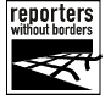Reporters Without Borders has named U Win Tin, right, “Journalist of the Year” for his commitment to freedom of the press in Burma. U Win Tin, a 76-year-old Burmese journalist, was sentenced to 20 years in prison for “subversion” and “anti-government propaganda” in 1989. -The Norwegian Burma Committee warmly welcomes RSF’s choice, says information officer Åse Sand. -Burma is one of the most brutal dictatorships in the world and among the worst violators of press freedom. (05-FEB-07)
Based on World Movement for Democracy’s reporting about the award and the Norwegian Burma Committee’s information officer Åse Sand’s comments, this article has been prepared for publication here by HRHF / Niels Jacob Harbitz.

 After more than 17 years in prison and despite faltering health and extremely poor prison conditions, U Win Tin still refuses to renounce his commitment to the National League for Democracy, despite being offered his freedom for doing so. He continues to call for the unconditional release of thousands of political prisoners. U Win Tin was one of the political mentors of Nobel Peace Prize laureate Daw Aung San Suu Kyi, who also remains deprived of her freedom. Because of the conditions under which U Win Tin is being held, it is possible that he remains unaware that he has received this award. Above right, Amnesty International UK demonstrating for U Win Tin’s release.
After more than 17 years in prison and despite faltering health and extremely poor prison conditions, U Win Tin still refuses to renounce his commitment to the National League for Democracy, despite being offered his freedom for doing so. He continues to call for the unconditional release of thousands of political prisoners. U Win Tin was one of the political mentors of Nobel Peace Prize laureate Daw Aung San Suu Kyi, who also remains deprived of her freedom. Because of the conditions under which U Win Tin is being held, it is possible that he remains unaware that he has received this award. Above right, Amnesty International UK demonstrating for U Win Tin’s release. To sign Repoerters Without Border’s petition for U Win Tin, go to:
To sign Repoerters Without Border’s petition for U Win Tin, go to:
www.rsf.org/article.php3?id_article=2059
 -Despite his age and deteriorating health U Win Tin is not willing to give up his political principles for a life in freedom, comments Sand, right. -He demonstrates an impressive steadfastness in his commitment to and belief in a political transition to democracy in Burma. At the same time we must not forget that there are about 1100 political prisoners suffering the same destiny as U Win Tin. On the positive side, last year the number of publications increased in the country. In October foreign journalists, some of whom had been banned from the country for years, were surprisingly given journalist visa to cover the resuming National Convention, all carefully organised by the junta of course. However, on the negative side, the surveillance has increased and the method of telephone tapping is widely used, which strengthen an environment of paranoia and suspicion. This development is worrying as it makes journalists’ work even more difficult and promotes self censorship.
-Despite his age and deteriorating health U Win Tin is not willing to give up his political principles for a life in freedom, comments Sand, right. -He demonstrates an impressive steadfastness in his commitment to and belief in a political transition to democracy in Burma. At the same time we must not forget that there are about 1100 political prisoners suffering the same destiny as U Win Tin. On the positive side, last year the number of publications increased in the country. In October foreign journalists, some of whom had been banned from the country for years, were surprisingly given journalist visa to cover the resuming National Convention, all carefully organised by the junta of course. However, on the negative side, the surveillance has increased and the method of telephone tapping is widely used, which strengthen an environment of paranoia and suspicion. This development is worrying as it makes journalists’ work even more difficult and promotes self censorship.


